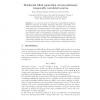Free Online Productivity Tools
i2Speak
i2Symbol
i2OCR
iTex2Img
iWeb2Print
iWeb2Shot
i2Type
iPdf2Split
iPdf2Merge
i2Bopomofo
i2Arabic
i2Style
i2Image
i2PDF
iLatex2Rtf
Sci2ools
121
click to vote
ESANN
2007
2007
Markovian blind separation of non-stationary temporally correlated sources
In a previous work, we developed a quasi-efficient maximum likelihood approach for blindly separating stationary, temporally correlated sources modeled by Markov processes. In this paper, we propose to extend this idea to separate mixtures of non-stationary sources. To handle non-stationarity, two methods based respectively on blocking and kernel smoothing are used to find parametric estimates of the score functions of the sources, required for implementing the maximum likelihood approach. Then, the proposed methods exploit simultaneously non-Gaussianity, nonstationarity and time correlation in a quasi-efficient manner. Experimental results using artificial and real data show clearly the better performance of the proposed methods with respect to classical source separation methods.
Correlated Sources | ESANN 2007 | Maximum Likelihood Approach | Neural Networks | Quasi-efficient Maximum Likelihood |
Related Content
| Added | 29 Oct 2010 |
| Updated | 29 Oct 2010 |
| Type | Conference |
| Year | 2007 |
| Where | ESANN |
| Authors | Rima Guidara, Shahram Hosseini, Yannick Deville |
Comments (0)

